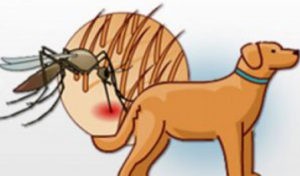Itching in small animals is an all too common problem seen in veterinary clinics. Red, inflamed, oozing lesions and rashes with bald spots appearing are hallmark signs of an allergic reaction occurring in your pet. Most often, these symptoms are caused by a cutaneous adverse food reaction, also known as a food allergy.
Food allergies put your pets in immense discomfort; and if left untreated can cause your pet to develop chronic inflammation, putting them at risk for secondary problems such as chronic bacterial and/or fungal skin and ear infections.
So, what causes these food reactions? Potential allergens include protein sources (chicken, turkey, beef, lamb, soy, dairy, eggs etc.) and carbohydrate sources (corn, rice, barley, wheat etc.).
When your pet consumes a protein or carbohydrate source in which they are allergic to, it is combined or altered in their body into a form which their immune system recognizes as a foreign invader. This causes their immune system to launch an attack against the substance, resulting in inflammation of the gastrointestinal (GI) tract and/or other organ systems. In dogs and cats, it is their skin which most often suffers from this immunologic activity.
Some pets can have more than one food allergy, these allergies typically start in pets younger than 1 year or older than 7 years of age, but can be acquired at any time, even if the pet has been eating the same food for months to years.
Many people assume itching due to food allergy requires a recent diet change. However, in many cases this is not true.
Symptoms of Food Allergies
The main symptoms of food allergies in dogs and cats includes:
- Nonseasonal itching of face, ears, body, groin, paws
- Licking or chewing of paws and groin area
- Hair loss
- Redness of skin
- Chronic ear and skin infections
- About 20% of food-allergic pets also have GI signs such as flatulence, vomiting, diarrhea, loud intestinal sounds, or defecating more than four to five times a day
- Dogs often scratch their face, ears, feet, groin or anal area or develop recurrent skin or ear infections
- Cats may overgroom certain areas of the body or the whole body, exhibit intense itching at the face or neck, or develop ear infections

Diagnosis and Treatment of Food Allergies
There is only one accurate way to diagnose food allergies in animals, and that is done by an elimination diet trial. Elimination diet trials are performed by removing ALL foods currently fed to the animal and placing them on a strict, single protein diet for a minimum of 2 months. Unfortunately, while blood allergy panels are available for cats and dogs, the accuracy of these tests are questionable.
Elimination trial diets consist of either a home-cooked or prescription therapeutic diet containing protein and carbohydrate sources in which the pet has never been exposed to before and that are low on the allergenic index (less likely to cause allergic reactions). These diets often consist of novel proteins; such as rabbit, duck, venison, and kangaroo. If novel proteins are not selected, a hydrolyzed diet may be used. These diets contain common proteins (like chicken) which have been altered molecularly to not induce an allergic response in animals. The new elimination diet should be gradually introduced to the pet over a period of 7 days, this decreases the likeliness of GI problems developing as a result of sudden diet change.
How Long Does the Elimination Diet Trial Last?
At McQueen Animal Hospital, we like our elimination diet trials to last at least 2 months. This means 2 months of your pet strictly consuming only the prescribed diet and approved treats, nothing else. If the pet has a food allergy, we expect to see a 50% reduction in dermatologic signs like itching/scratching/licking after 2 months time. In some dogs, 12 weeks is needed to see resolution of allergy symptoms. In cats, 3-4 months on an elimination diet is often required before accurate diagnosis can be made.
Will My Pet Be on Prescription Food Forever?
The goal of elimination diet trials is not to have your pet on a prescription food for life, but rather to initially resolve their allergy symptoms so that we may begin reintroducing one by one more common protein sources and monitoring them for reactions.
To explain it simply,
If patient “Roxy” comes in with allergy symptoms and we place her on an elimination diet trial for 2 months, her allergy symptoms should subside by the end of the 8-week period if she does have a food allergy. If symptoms subside, Roxy has now been diagnosed with a food allergy. At this point, the veterinarian may suggest that Roxy be fed a more common type of protein again, let’s say, a chicken-based diet. If we place Roxy on this chicken-based diet and her allergy symptoms return (it may take days or weeks for the allergy symptoms to return) then we positively know that Roxy has a chicken allergy. She can then be placed back on the “safe” diet until her allergy symptoms resolve and once they do, we can introduce another protein to her and observe for reactions. This cycle is performed until a “safe” protein source is found. At this point (with the help of the veterinarian) pet-store brands may be considered. This process is not to be taken on by yourself, diet changes in animals with allergies should only be performed by veterinarians.
The End Goal
It is not our goal to have your pet on allergy medication for their entire life, allergy medications like Apoquel are only meant to be given as temporary relief of severe allergy symptoms in animals. Our goal is to find a diet for your pet which works best for you and your furry friend. Elimination diet trials are hard and require much diligence, but the pay-off is well worth it when done correctly. If elimination diet trial instructions are followed fully, your pet will be able to live comfortably consuming a diet which they enjoy that does not induce allergy symptoms in them.
McQueen Animal Hospital is proud to provide you with finest quality services in animal care in the Brampton region; we are located at 8975 McLaughlin Road, L6Y 0Z6 and are happy to answer any of your questions via phone at 905-455-7387.
Author: Jessica Wilkans, RVT at McQueen Animal Hospital




